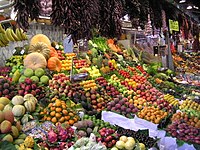| Revision as of 03:52, 30 December 2005 edit67.187.195.240 (talk) →See also← Previous edit | Revision as of 22:17, 10 January 2006 edit undoDijxtra (talk | contribs)8,108 edits merging info from marketNext edit → | ||
| Line 1: | Line 1: | ||
| {{cleanup}} | |||
| {{wikify}} | |||
| {{otheruses}} | |||
| ], ] are still common in ]. Resellers and farmers sell fruits and vegetables, but also meat and fish, and other products.]] | |||
| A '''marketplace''' is the space, actual or metaphorical, in which a ] operates. The term is also used in a ] ] context to denote the actual consumer environment, ie. the 'real world' in which products and services are provided and consumed. | A '''marketplace''' is the space, actual or metaphorical, in which a ] operates. The term is also used in a ] ] context to denote the actual consumer environment, ie. the 'real world' in which products and services are provided and consumed. | ||
| ==Marketplaces and street markets== | |||
| ''For other uses of the term, see also: ]'' | |||
| <br> | |||
| ] | |||
| ''Also the name of a consumer affairs program on the ] | |||
| ] | |||
| <br> | |||
| ] | |||
| ''For other kinds of marketplaces, see: ]'' | |||
| A ] is a location where goods and services are exchanged. The traditional ] is a ] ] where traders set up stalls and buyers browse the merchandise. This kind of market is very old, and countless such markets are still in operation around the whole world. | |||
| * In the USA such markets fell out of favor, but renewed interest in ] has cause the reinvention of this type of market, called ]s, in many towns and cities. | |||
| * In continental ], especially in ], street markets, as well as "marketplaces" (covered places where merchants have stalls, but not entire stores) are commonplace. Both resellers and producers sell their wares to the public. | |||
| * Markets are often temporary, with stalls only present for one or two days a week ("market days"), however some (such as ] in ], ]) are open every day of the week. Such markets are normally specialist—the various stalls of Camden Market, along with the shops associated with it, sell a variety of alternative lifestyle products ranging from clothes and jewellery to CDs, instruments and furniture. An example of a large market is ] in ]. | |||
| The Roman term for market, still in use in a related sense, is '''forum'''. The modern ] can be seen as an extension of this concept. | |||
| ==Wholesale markets== | |||
| A wholesale market is a market which primarily sells to traders such as caterers and small shopkeepers, rather than to members of the public, although members of the public are not necessarily excluded. ], ] has several centuries old wholesale markets such as ] and ]. | |||
| ==See also== | ==See also== | ||
| *] | *] | ||
| *] | |||
| *] | |||
| *] | |||
| *] | |||
| *] | |||
| ==External links== | |||
| ⚫ | |||
| ⚫ | |||
| ⚫ | |||
| ⚫ | |||
| ---- | |||
| {{Econ-stub}} | {{Econ-stub}} | ||
Revision as of 22:17, 10 January 2006
You must add a |reason= parameter to this Cleanup template – replace it with {{Cleanup|reason=<Fill reason here>}}, or remove the Cleanup template.
| Template:Wikify is deprecated. Please use a more specific cleanup template as listed in the documentation. |

A marketplace is the space, actual or metaphorical, in which a market operates. The term is also used in a trademark law context to denote the actual consumer environment, ie. the 'real world' in which products and services are provided and consumed.
Marketplaces and street markets
A marketplace is a location where goods and services are exchanged. The traditional market square is a city square where traders set up stalls and buyers browse the merchandise. This kind of market is very old, and countless such markets are still in operation around the whole world.
- In the USA such markets fell out of favor, but renewed interest in local food has cause the reinvention of this type of market, called farmers' markets, in many towns and cities.
- In continental Europe, especially in France, street markets, as well as "marketplaces" (covered places where merchants have stalls, but not entire stores) are commonplace. Both resellers and producers sell their wares to the public.
- Markets are often temporary, with stalls only present for one or two days a week ("market days"), however some (such as Camden Market in London, UK) are open every day of the week. Such markets are normally specialist—the various stalls of Camden Market, along with the shops associated with it, sell a variety of alternative lifestyle products ranging from clothes and jewellery to CDs, instruments and furniture. An example of a large market is Chatuchak weekend market in Bangkok.
The Roman term for market, still in use in a related sense, is forum. The modern shopping mall can be seen as an extension of this concept.
Wholesale markets
A wholesale market is a market which primarily sells to traders such as caterers and small shopkeepers, rather than to members of the public, although members of the public are not necessarily excluded. London, England has several centuries old wholesale markets such as Smithfield Market and Billingsgate Fish Market.
See also
External links
Example of a Freelance Marketplace Example of a Contractor Marketplace
This economics-related article is a stub. You can help Misplaced Pages by expanding it. |


